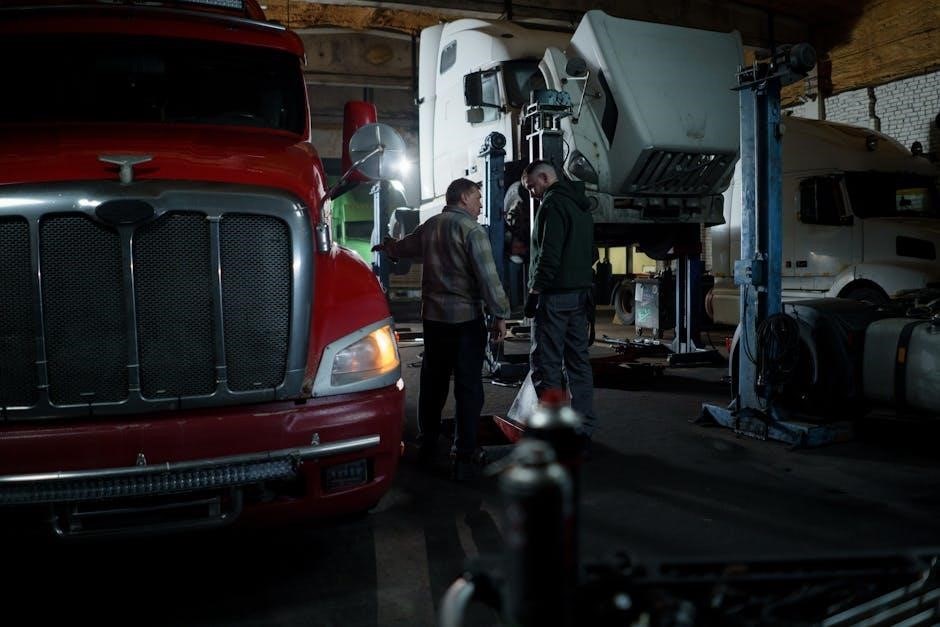diesel cars with manual transmission
Diesel cars with manual transmission offer a unique blend of fuel efficiency, durability, and driver control, making them a popular choice for both daily commuting and long-distance driving.
1.1 Overview of Diesel Engines
Diesel engines are known for their exceptional fuel efficiency and longevity, making them a preferred choice for drivers seeking reliability and lower operating costs. These engines operate on the principle of compression ignition, where fuel is injected into cylinders filled with compressed air, igniting without spark plugs. This process results in higher torque output, which enhances performance, especially for towing and hauling. Modern diesel engines also incorporate advanced technologies like turbocharging and particulate filters to reduce emissions and improve efficiency further. While they may be heavier and noisier than gasoline engines, their durability and cost-effectiveness make them a popular option for long-distance driving and heavy-duty applications.
1.2 Overview of Manual Transmission
Manual transmission, also known as a stick shift, provides drivers with direct control over gear changes, enhancing the driving experience. It consists of a clutch pedal and a gearshift, allowing drivers to manually select the appropriate gear for speed and terrain. This setup is mechanically simpler and more cost-effective compared to automatic transmissions, making it a popular choice for diesel engines. Manual transmissions are often preferred for their fuel efficiency, as they allow drivers to optimize engine speed and torque. Additionally, the tactile engagement of shifting gears appeals to many drivers, offering a more connected and immersive driving experience, especially in diesel vehicles where torque delivery is smooth and consistent.

Advantages of Diesel Engines
Diesel engines offer superior fuel efficiency, longevity, and higher torque, making them ideal for both performance and cost-effectiveness over time.
2.1 Fuel Efficiency and Longevity
Diesel engines are renowned for their exceptional fuel efficiency, particularly in long-distance driving, where they often achieve better mileage compared to gasoline engines. This efficiency translates to lower fuel costs over time. Additionally, diesel engines are built to last, with robust construction that withstands heavy use and delivers reliability. The combination of fuel efficiency and longevity makes diesel engines a cost-effective choice for drivers seeking durability and performance. Regular maintenance further enhances their lifespan, ensuring they remain efficient and reliable for years. This makes diesel engines a practical option for those prioritizing both economy and endurance.
2.2 Higher Torque and Performance
Diesel engines deliver exceptional torque, which provides strong acceleration and towing capacity, making them ideal for hauling heavy loads or driving uphill. The manual transmission enhances this performance by allowing drivers to control gear shifts precisely, optimizing power delivery. This combination results in a more responsive and engaging driving experience. Higher torque also means better low-end grunt, reducing the need for frequent gear changes in city traffic or on uneven terrain. Overall, the powerful torque output of diesel engines, paired with the control of a manual transmission, offers a dynamic and efficient driving experience tailored for both performance and practicality.

Benefits of Manual Transmission
Manual transmissions offer cost-effectiveness, better fuel economy, and lower maintenance costs compared to automatics, while providing drivers with more control and a more engaging driving experience.
3.1 Cost-Effectiveness
Manual transmissions are generally more affordable to purchase and maintain than automatics. They typically have fewer components, reducing production costs and the likelihood of expensive repairs. Additionally, diesel engines, known for their fuel efficiency, complement manual transmissions by lowering fuel expenses over time. This combination makes diesel cars with manual transmission a financially prudent choice for budget-conscious drivers. The lower upfront cost and long-term savings on fuel and maintenance contribute to their popularity among those seeking a cost-effective yet reliable vehicle option.
3.2 Enhanced Driver Engagement
Diesel cars with manual transmission offer a more immersive driving experience, requiring active participation from the driver. The manual gearbox allows for precise control over gear shifts, enabling drivers to optimize performance and fuel efficiency. This hands-on approach fosters a stronger connection between the driver and the vehicle, making the driving process more engaging and enjoyable. The tactile feedback from the clutch and gear lever adds to the sensory experience, creating a sense of mastery and satisfaction. For enthusiasts, the ability to manually manage torque delivery enhances the driving dynamics, making even routine commutes feel more rewarding and interactive.

Why Choose Diesel with Manual Transmission?
Diesel engines paired with manual transmissions are ideal for drivers seeking a balance of performance, efficiency, and control. The combination offers superior torque, which enhances towing capacity and acceleration, especially in hilly or heavy-load conditions. Manual transmissions also provide better fuel economy compared to automatics, making diesel cars a cost-effective choice for long-distance drivers. Additionally, the direct connection between the driver and the vehicle fosters a more engaging experience. For those prioritizing durability, diesel engines are known for their longevity. Overall, diesel cars with manual transmission cater to practicality and driving enthusiasts alike, offering a blend of economy, power, and driving satisfaction that appeals to a wide range of motorists.

Popular Models
Popular diesel cars with manual transmission include the Volkswagen Golf TDI, BMW 320d, and Ford Focus ST TDCi, offering a mix of efficiency and performance.
5.1 European Models
European models like the Volkswagen Golf TDI and BMW 320d are renowned for their refined diesel engines and smooth manual transmissions, offering excellent fuel efficiency and driving dynamics. These cars are popular for their durability and performance, making them ideal for both city and highway driving. The Ford Focus ST TDCi is another standout, delivering sporty handling and impressive torque. These European models are celebrated for their engineering excellence and are often preferred by drivers who value both economy and driving engagement.
5.2 Asian Models
Asian models such as the Hyundai Sonet HTK Plus Diesel and Kia Seltos Diesel offer excellent value with their efficient engines and responsive manual transmissions. These compact SUVs are known for their reliability and affordability, making them popular choices in their respective markets. The Tata Nexon and Mahindra XUV300 are also notable, delivering impressive mileage and robust performance. These Asian models are praised for their cost-effectiveness and practicality, catering to drivers seeking a balance between economy and versatility. Their affordable maintenance and durable build quality further enhance their appeal in competitive automotive markets.
Performance and Handling
Diesel cars with manual transmission are renowned for their exceptional torque delivery, providing robust acceleration and responsive handling. The combination of a diesel engine’s low-end grunt and a manual gearbox allows drivers to exploit the power band effectively, making these vehicles ideal for both city driving and highway cruises.
The precise control offered by a manual transmission enhances the driving experience, enabling smoother gear shifts and better traction, especially in varying road conditions. Models like the Hyundai Sonet and Kia Seltos demonstrate excellent handling characteristics, blending comfort with agility. This setup ensures a dynamic and engaging drive, making diesel manual cars a favorite among enthusiasts who value performance and responsiveness behind the wheel.
Maintenance Tips
Regular maintenance is essential to ensure the longevity and optimal performance of diesel cars with manual transmission. Start with frequent oil changes, using high-quality diesel engine oil to prevent soot buildup. Replace the fuel filter every 10,000 to 15,000 miles to avoid contamination. Check and clean the air filter regularly to maintain fuel efficiency. Inspect the clutch fluid levels and top them up as needed for smooth gear shifts. Avoid riding the clutch to prevent wear. Schedule regular timing belt inspections to prevent costly repairs. Finally, adhere to the manufacturer’s servicing schedule for diesel engines to address potential issues early. Proper care ensures a smooth and reliable driving experience.
Fuel Efficiency Comparison
Diesel cars with manual transmission are known for their superior fuel efficiency compared to petrol counterparts. Diesel engines achieve higher mileage due to their compression-based combustion, which extracts more energy from fuel. Manual transmissions further enhance efficiency by eliminating the energy loss associated with automatic torque converters. On average, diesel manuals can deliver up to 20-30% better fuel economy than petrol manuals. Additionally, they often outperform diesel automatics, as manuals allow drivers to control gear shifts precisely, optimizing fuel use. This makes diesel manual cars a cost-effective choice for long-distance drivers and those seeking lower fuel costs over time. Their efficiency also reduces carbon emissions, appealing to eco-conscious drivers.
Environmental Impact
Diesel cars with manual transmission have a mixed environmental impact. While they offer superior fuel efficiency, reducing CO2 emissions, diesel engines emit higher levels of nitrogen oxides and particulate matter compared to petrol engines. Modern diesel engines, however, incorporate technologies like catalytic converters and particulate filters to minimize these emissions. The manual transmission further optimizes fuel use, slightly lowering overall emissions. Despite these advancements, diesel vehicles remain less eco-friendly than hybrid or electric alternatives. Proper maintenance and driving habits can help mitigate their environmental footprint, but they still face scrutiny in regions with strict emission standards. Balancing efficiency and emissions remains a key challenge for diesel manual cars in today’s eco-focused market.
Driving Experience
Diesel cars with manual transmission deliver a distinctive driving experience, combining robust torque delivery with precise control over gear shifts. The manual gearbox allows drivers to fully engage with the vehicle, offering a sense of connection to the road. Diesel engines provide strong low-end torque, making acceleration smooth and responsive, especially in lower gears. This setup is particularly enjoyable on winding roads or during long drives, where the ability to modulate speed and gear ratios enhances driving satisfaction. However, the heavier clutch and engine noise may require more effort in stop-and-go traffic. Overall, the combination of diesel power and manual transmission fosters a rewarding, hands-on driving experience that appeals to enthusiasts seeking both performance and efficiency.
Diesel cars with manual transmission remain a viable option for drivers seeking efficiency, performance, and control. While they face challenges from evolving emissions standards and shifting consumer preferences, advancements in diesel technology promise cleaner and more efficient engines. The manual gearbox, though less common, continues to appeal to driving enthusiasts who value precision and engagement. Moving forward, the future of diesel cars with manual transmission may hinge on niche markets and technological innovations that balance environmental concerns with the inherent benefits of diesel power. As automotive trends evolve, this classic combination could find new life in specialized applications, ensuring its relevance in an ever-changing industry landscape.
